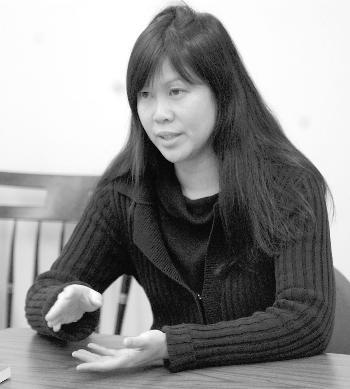A recently published book by Vivian S. Louie, assistant professor at the Harvard Graduate School of Education, suggests that, contrary to what many believe, socioeconomic background and racial discrimination has a strong influence on the educational opportunities of Chinese-American college students.
Louie’s book, Compelled to Excel: Immigration, Education, and Opportunity Among Chinese Americans, rests on the argument that race and class do matter—not always a popular view.
Post-civil rights America likes to think of itself as rising up by its bootstraps, Louie said in a recent interview. And the “model-minority myth”—the idea that Asian Americans can succeed in the United States regardless of their background—only propagates the idea that class and race doesn’t matter.
“Asian Americans are held up as an example to other groups, both immigrant- and native-born,” she said. Louie interviewed 68 second-generation Chinese Americans attending Hunter College and Columbia University and compared the experiences of students from suburban, middle-class America to those who grew up in ethnic enclaves like Chinatown or Flushing, New York.
Even though the parents of both groups expressed high hopes for their children’s success in the United States, Louie argued that the road to college is ultimately shaped by social class.
Suburban families can afford to pay for good educational opportunities, while parents in enclaves have to depend on ethnic networks, she said.
Edward H. Thai ’07, political chair of the Harvard-Radcliffe Chinese Students’ Association (HRCSA), said his personal experience supports the thesis of Louie’s new book.
“I grew up in suburban America, and I haven’t suffered any difficulties per se,” said Thai, who is a second-generation Chinese-Vietnamese-American, “whereas I have family in poorer Philadelphia who don’t have the same opportunities and have a harder time doing well.”
Assistant Professor of Sociology Prudence L. Carter has not read Louie’s book yet but is familiar with its thesis.
“What I like about this book is it shows how heterogenous even a group like Chinese Americans can be,” she said.
But Louie said that while her respondents acknowledged a racial hierarchy and class inequality, they subscribed to the idea that their ethnic culture was more important for success than financial and educational resources.
“Even kids who haven’t done well in enclaves and feel stigmatized say ‘we’re the exception,’” she said.
Kate Wang ’07, vice-president of HRCSA, describes a “self-fulfilling prophecy” among Chinese Americans.
“Growing up and being exposed to Chinese people being perfect academics, you sort of follow that path subconsciously,” she remembers.
In her book, Louie also suggests that the perception of racial discrimination—the source of what she calls “immigrant pessimism”—looms large.
“Parents feel that being Asian and Chinese wouldn’t help their kids,” she explained. “That’s why they encourage higher education.”
Louie said she was surprised that a lot of her respondents felt they would always be considered outsiders.
But some students, like Thai, are optimistic about being embraced as “true Americans,” citing the influx of immigrants and growing multi-culturalism as good portents.
—Staff writer Lulu Zhou can be reached at luluzhou@fas.harvard.edu.
Recommended Articles
-
Report Criticized for Racial GroupingsA week after the release of a report on the achievement of certain ethnic groups in higher education, some are
-
Practice PatienceT HE MAJORITY VIEW overstates the Khadafy problem and misses the point. The point is disproportion: what Khadafy's bombthrowers did
-
Nakasone Apologizes for Ethnic SlurTOKYO--Prime Minister Yasuhiro Nakasone made a "heartfelt apology" yesterday to all Americans for comments that many took as racist slurs
-
Extend Health Care to AllAs America’s eyes remain transfixed on the economy at home and the war on terror abroad, the plight of our
-
Kunjufu Calls on Black Americans to Unite, Overcome Rumors and Myths in EducationCalling for more Black role models in the schools and for investment in Black communities, Jawanza Kunjufu, president of African
-
 Weighing in on the Fat Tax
Weighing in on the Fat Tax














